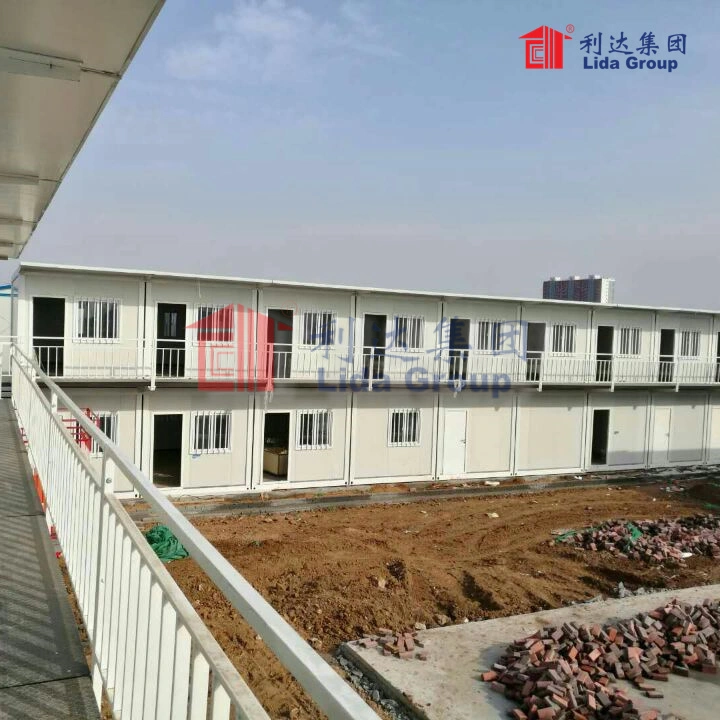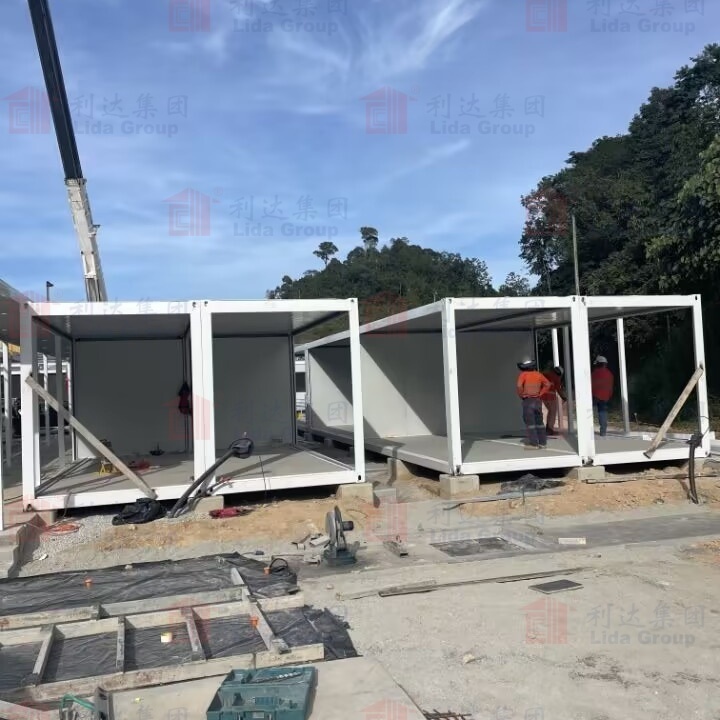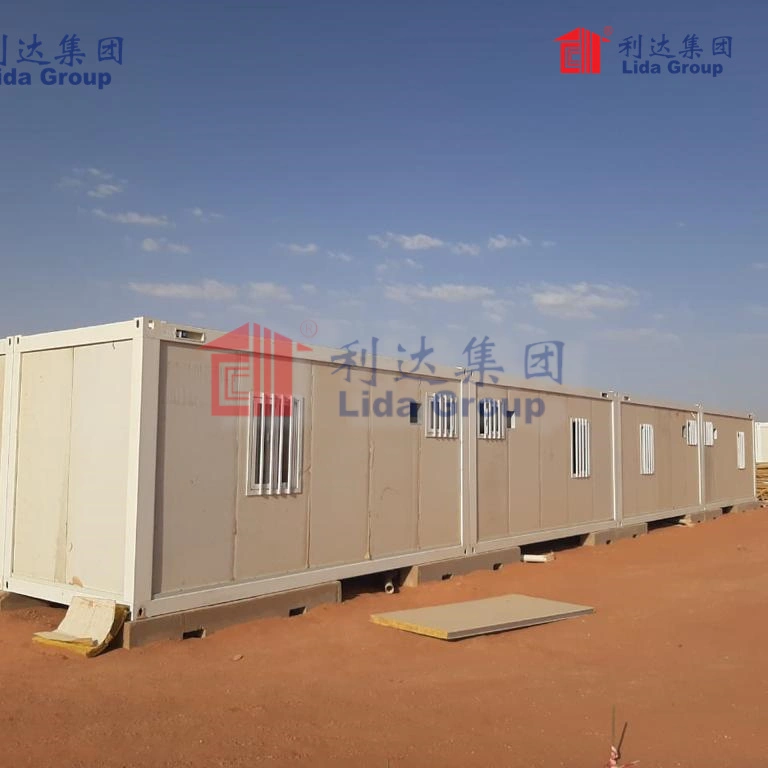Tel: 0086-532-88966982
0086-532-88965892
Website: www.lidajituan.com
E-mail: sales@lidajituan.com
Head office: 5th Floor, Building A, Dalen Center, 180 Haier Road, Qingdao, 266000, China
Why Expandable Container Houses Are Revolutionizing Temporary Housing in Construction
Classification:Company News
Release time:2025-05-14 11:00
Why Expandable Container Houses Are Revolutionizing Temporary Housing in Construction
The construction industry is no stranger to challenges—tight deadlines, fluctuating project scales, and the need for adaptable infrastructure in remote or harsh environments. Traditional temporary housing solutions, such as trailers or makeshift shelters, often fall short in terms of durability, cost, and flexibility. Enter expandable container houses, a groundbreaking innovation that’s redefining how the industry approaches temporary accommodations. Companies like Lida Group, a global leader in container building technology, are at the forefront of this shift, providing scalable, efficient, and sustainable solutions for construction sites, mining camps, and oil & gas projects. This article explores the transformative impact of expandable container houses and why they’re becoming indispensable in modern construction.
1. What Are Expandable Container Houses?
Expandable container houses are modular structures designed to increase living or working space on demand. Unlike standard container houses, which have fixed dimensions, these units feature collapsible walls or extensions that can be unfolded or stacked vertically. When contracted, they are compact for easy transport; when expanded, they offer up to double the original floor area.
This hybrid design merges the mobility of flat pack container systems with the spaciousness of traditional modular house setups. For example, Lida Group’s expandable units are engineered with hydraulic mechanisms, allowing crews to adjust space in minutes—ideal for projects that require rapid scaling, such as highway construction or offshore oil rig installations.

2. Cost Efficiency: Maximizing Budgets in Temporary Projects
Construction budgets are often stretched thin by unexpected delays or scope changes. Expandable container houses address this by optimizing both initial and long-term costs:
- Lower Transportation Costs: Compacted units reduce shipping fees by 30–50% compared to pre-assembled structures.
- Reduced Labor Expenses: Minimal on-site assembly is required—no cranes or specialized machinery needed.
- Reusability: Units can be collapsed, moved, and reused across multiple projects, eliminating the need for new purchases.
A 2023 case study by Lida Group in a UAE oilfield expansion showed that using expandable housing slashed accommodation costs by 40% versus traditional site-built dormitories.
3. Speed and Flexibility: Meeting Tight Deadlines
Time is a critical resource in construction. Expandable container houses excel in rapid deployment:
- Pre-Fabricated Design: 90% of construction is completed in factories, ensuring weather-independent timelines.
- Plug-and-Play Setup: Units arrive with pre-installed electrical, plumbing, and HVAC systems, cutting on-site work by weeks.
- Adaptability: Expand or contract spaces as project needs evolve—perfect for phases requiring varying workforce sizes.
For instance, during a Canadian mining project, Lida Group’s expandable units were deployed in -30°C conditions, with fully functional offices and housing operational within 48 hours.
4. Durability for Extreme Environments
Construction sites, mining operations, and oil & gas fields often face extreme conditions—blizzards, sandstorms, or corrosive salt air. Expandable container houses are built to endure these challenges:
- Corten Steel Frames: Naturally resistant to rust, fire, and heavy impacts.
- Insulated Panels: Maintain comfortable temperatures in Arctic winters or desert summers.
- Seismic-Resistant Features: Reinforced joints and foundations ensure stability in earthquake-prone regions.
Lida Group’s designs include optional features like hurricane-resistant anchoring and dust-proof ventilation, making them a reliable choice for projects in volatile climates.

5. Sustainability: Aligning with Green Construction Trends
As the construction industry prioritizes ESG (Environmental, Social, Governance) goals, expandable container houses offer eco-friendly advantages:
- Recycled Materials: Repurposed shipping containers divert steel waste from landfills.
- Energy Efficiency: Solar-ready roofs and LED lighting reduce reliance on fossil fuels.
- Low Waste Production: Precision factory manufacturing minimizes material excess.
In Australia, a wedding container house project by Lida Group showcased off-grid living with solar panels and rainwater harvesting, proving that sustainability and luxury can coexist.
6. Multi-Industry Applications Beyond Construction
While construction is a primary beneficiary, expandable container houses are versatile across sectors:
- Mining: Temporary offices, labs, and worker housing in remote exploration sites.
- Oil & Gas: Mobile command centers, equipment storage, and emergency response units.
- Events: Pop-up wedding container house venues or disaster relief shelters.
Their modularity ensures they meet diverse needs without compromising quality.

7. Case Study: Lida Group’s Highway Construction Project in Norway
In 2022, Lida Group partnered with a Norwegian infrastructure firm to provide housing for 200 workers building a mountain tunnel. Challenges included limited space, harsh winters, and strict environmental regulations. The solution?
- 50 Expandable Units: Collapsed for easy transport via narrow roads, then expanded to create 2-story dormitories.
- Eco-Friendly Features: Geothermal heating and greywater systems met Norway’s sustainability laws.
- 30% Cost Savings: Achieved through reuse of units in subsequent phases.
This project highlighted how expandable container houses can overcome logistical and regulatory hurdles.
8. The Future of Temporary Housing
The demand for agile, cost-effective solutions will only grow as construction projects become more complex. Innovations on the horizon include:
- Smart Expandable Units: IoT-integrated systems for energy monitoring and remote control.
- Hybrid Designs: Combining office container workspaces with residential zones in a single unit.
- 3D-Printed Add-Ons: Customizable interiors printed on-site for rapid personalization.
Lida Group is already piloting AI-driven climate control in its units, setting a new standard for intelligent temporary housing.
Conclusion: A Paradigm Shift in Construction Accommodations
Expandable container houses are more than a trend—they’re a strategic response to the evolving needs of the construction industry and beyond. By offering unmatched flexibility, durability, and sustainability, these units address critical pain points in mining, oil & gas, and infrastructure development.
Companies like Lida Group are proving that temporary housing doesn’t have to mean compromised quality. Whether it’s a collapsible office container on a skyscraper site or a luxurious wedding container house for off-grid events, the expandable container revolution is here to stay.

container house,office container,modular house,constructions
Contact Us
Head Office: 5th Floor,Building A,Darron Center,No.180,Haier Road,Qingdao, 266000,China
Tel: 0086-532-88966982 88965892 Fax:0086-532-88965571
WhatsApp:+86 13793209022
Mobile/Wechat:+86-15166671720
Email: sales@lidajituan.com Website: www.lidajituan.com
Alternate Website: www.lidamodularhouse.com
Head Office: 5th Floor,Building A,Darron Center,No.180,Haier
Road,Qingdao, 266000,China
Tel: 0086-532-88966982 88965892
Fax:0086-532-88965571
Email: sales@lidajituan.com
Website: www.lidajituan.com
Alternate Websit: www.prefabhousecn.com
Wechat/WhatsApp:+86-13793209022
Copyright(c)2023 All Rights Reserved SEO Business license

